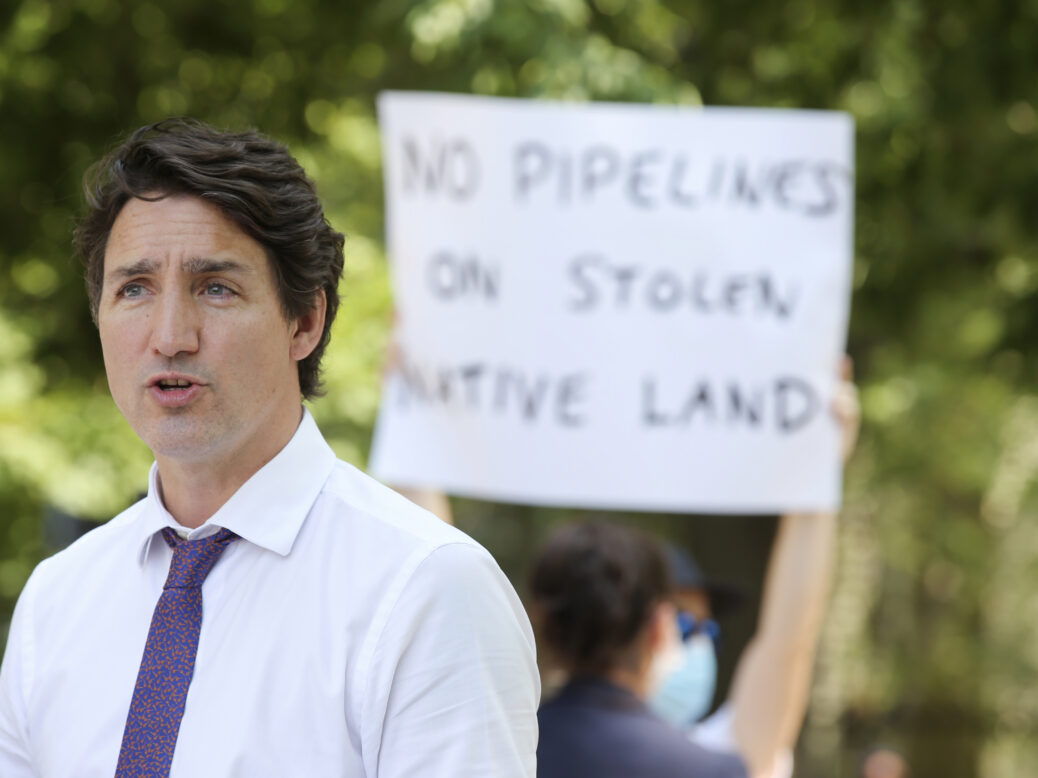
Just over four years ago, Theresa May dissolved parliament, triggering an early UK general election that seemed a safe bet to the Conservatives. Few things in politics are ever certain but, faced with a divided opposition and a comfortable Tory poll lead, the prime minister sensed an opportunity too tantalising to resist. The result, needless to say, proved catastrophic – May lost her majority and her premiership never recovered.
It’s too soon to gauge the damage that Canadian Prime Minister Justin Trudeau’s recent snap election could inflict on his political fortunes. But the parallels with May’s calculation are already striking.
Less than a month ago, polls seemed to give the incumbent Canadian Liberals a significant chance of winning back the majority they lost in the 2019 federal election. After a successful Covid-19 vaccination campaign, and with more than half the country reportedly satisfied with Trudeau’s handling of the pandemic, the prospect of a September election had a clear allure.
Faced with rumblings of a Conservative opposition so fractured that some Tories actually wanted to lose, Liberal strategists evidently anticipated an easy and painless victory. Opportunistic as the gamble so plainly was, few observers expected it to elicit more than a faint grumble from the electorate, even as Canada’s chief public health officer declared the beginning of a fourth Covid wave. In 1974, Trudeau’s own father, Pierre, had called an election only two years after losing his majority and was duly rewarded – a feat today’s Liberals clearly hoped to emulate.
But after a seemingly favourable start, Trudeau’s descent in the polls has been rapid. The Liberals have seen their probable majority evaporate, and are now facing the prospect of haemorrhaging seats to both the Conservatives and the social democrat New Democratic Party (NDP). According to polls, popular opinion of Trudeau himself has also markedly soured and, for the first time, the hitherto untested Tory leader Erin O’Toole has taken a narrow lead in some polls in the category of preferred prime minister. Perhaps most ominously of all, some surveys now detect a desire for change unseen since October 2015 – when the previous Conservative government was decisively ejected from office.
Barring some fundamental shift in momentum ahead of election day, the question is no longer whether Trudeau’s calculation has backfired but rather when (and if) the bleeding will stop. With O’Toole surging and NDP leader Jagmeet Singh enjoying high personal poll numbers, there’s even a very slight chance the Liberals could suffer a repeat of their 2011 humiliation (when they were reduced from 77 to just 34 seats). Support for each of the major parties has been remarkably fluid and, as ever, the complicated regional dynamics of Canadian federal politics will make the exact outcome difficult to predict before election day itself.
The more interesting question is how to account for Trudeau’s stumble and the sharp decline in Liberal polling since the campaign began. Most obviously, both opposition parties are clearly running stronger and more compelling campaigns than Liberal strategists expected. Sincerely or not, O’Toole’s Conservatives have made every effort to sound unthreatening and centrist – touting spending initiatives and even making (at least superficially) pro-worker noises by pledging to give them representation on some corporate boards. The NDP, for its part, has appeared to gain ground with progressive and left-leaning voters by pitching a series of new universal programmes – notably, national public childcare and prescription drug coverage – that it plans to fund through new taxes on wealth and excess profits made during the pandemic.
By contrast, the Liberal narrative at the campaign’s outset was rather thin gruel – Trudeau’s assertion that Canadians “needed to choose how we finish the fight against Covid-19” ultimately sounded contrived and unconvincing. While the Liberals have sought to reverse their decline by offering $78bn in new spending and promising to guarantee ten days of paid sick leave for federal workers, the electoral circumstances threaten to blunt their political effect. Having already served six years in office, and accrued a commensurate amount of baggage, Trudeau’s policy pledges now smack of opportunism rather than novelty or ambition. Such promises from an incumbent government inevitably invite voters to ask why they haven’t happened already.
Illusory though it was, Trudeau once carried the aura of a transformational figure. But from breaking an explicit pledge to reform Canada’s electoral system to the multibillion-dollar nationalisation of an oil pipeline, to becoming embroiled in a series of corruption scandals, his reign has seen this aura steadily evaporate. As such, many Canadians who registered their desire for change six years ago seem decidedly less drawn to the country’s traditional party of government and its patrician leader. With less than a fortnight until 20 September, the hunger for change remains strong. Owing to his opportunistic snap election, Trudeau may soon find voters looking to someone else to deliver it.
[See also: Canadian election 2021: can the Conservatives sustain their surge?]





